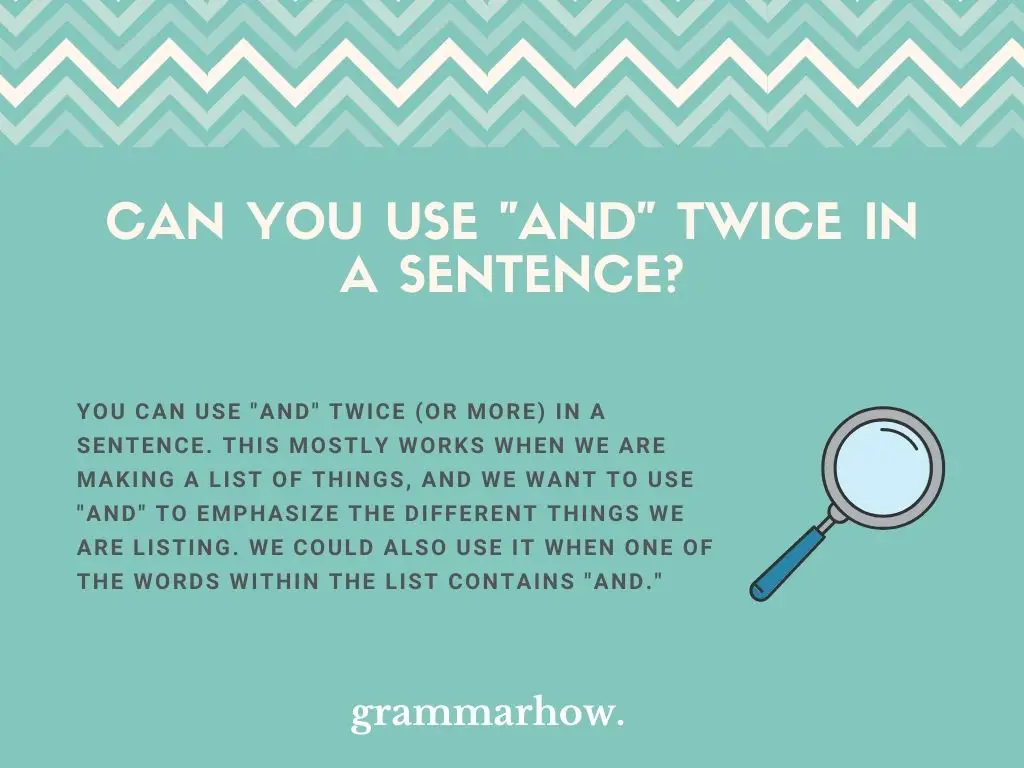“And” seems to be surrounded by a lot of English myths that are taught to us in our youths. Luckily, most of these myths are false, and we need not worry about them. One such myth that this article will look into is using “and” more than once in the same sentence.
Can You Use “And” Twice In A Sentence?
You can use “and” twice (or more) in a sentence. This mostly works when we are making a list of things, and we want to use “and” to emphasize the different things we are listing. We could also use it when one of the words within the list contains “and.”

Technically speaking, there is no limit to the amount of “and’s” we can use in a sentence.
- I like dogs, and cats, and squirrels, and ducks, and sheep, and fish, and cows.
The above sentence is grammatically correct. There is no reason we shouldn’t use “and” as many times as above. It helps to separate the individual parts of our list, which is better than simply writing:
- I like dogs, cats, squirrels, ducks, sheep, fish, and cows.
And to show you what we mean about a word already containing “and,” think about a food item that is made up of more than one thing. For example:
- I like lemon biscuits, chocolate biscuits, and strawberry and ginger biscuits.
“Strawberry and ginger” is the name of the flavor, so we include it as one entity, repeating the word “and.”
Is It Appropriate To Use “And” Multiple Times In A Sentence
You can use “and” as many times as you would like in most sentences. It is appropriate and grammatically correct. However, you shouldn’t use it to create a sentence that is much longer than a standard sentence would be before placing a comma.
Just because you’re using “and” to continue a point doesn’t mean you should use it every time. You can easily go overboard by using one too many “and’s,” which will make your sentence hard to read (and turn most people away from reading it).
You can see how many “and’s” might be over the top in the following example:
- When writing pronouns, I use him, and her, and me, and she, and we, and they, and I, and our, and his, and hers, and theirs, and yours.
While it might be good to list out everything like above, there are better ways to do it. If you’re going to include that many things in a list, you are better off with commas. Even better still, you should use “etc.” when you think you’ve gone far enough:
- When writing pronouns, I use him, her, me, she, we, etc.
Examples Of How To Use “And” Multiple Times In A Sentence
- I have a mother and a father, and a sister, but I don’t have a brother.
- You have made me an enemy and a friend, and I’m happy to be both.
- I am his girlfriend and his best friend, and I wouldn’t have it any other way.
- I like lemon ice cream, strawberry ice cream, and chocolate and hazelnut ice cream.
- You should talk to him and me about this and find out whether we’re comfortable with it.
You don’t always need to make a full list with multiple “and” words. Instead, we can just use it twice or more to add a few extra people or nouns into a sentence. We could also use “and” to connect two nouns and then another to create a second clause if the context allows.
Can I Use “&” And “And” In The Same Sentence?
Certain sentences will also allow you to replace “and” with the “&” sign.
If you combine two objects, you might then want to use “and” to introduce a second clause. When this is the case, it’s sometimes likely to use “&” to combine those objects to help with the sentence structure and flow.
- My mom & dad will be here shortly, and I think it’s time for you to leave.
How Can I Avoid Using “And” Twice In A Sentence?
If you don’t like using “and” more than once in a sentence, you can simply replace “and” with a period if it starts a new clause. If you’ve instead used it to create a long list, replace it with commas, or add an “etc.” to end the list early.
That could turn this:
- I like strawberries, and berries, and cherries, and raspberries.
Into this:
- I like strawberries, berries, cherries, etc.
Or this:
- My mom and dad aren’t happy, and I need to talk to you about it.
Into this:
- My mom and dad aren’t happy. I need to talk to you about it.
You may also like:
8 Better Words To Use Instead Of “And/Or”
10 Best Words to Use Instead of “And” to Start a Sentence
